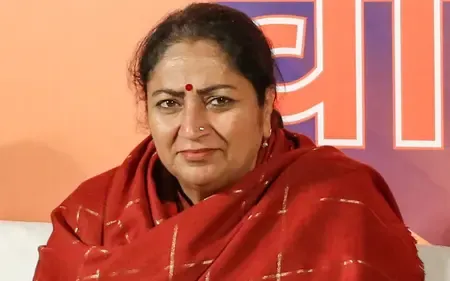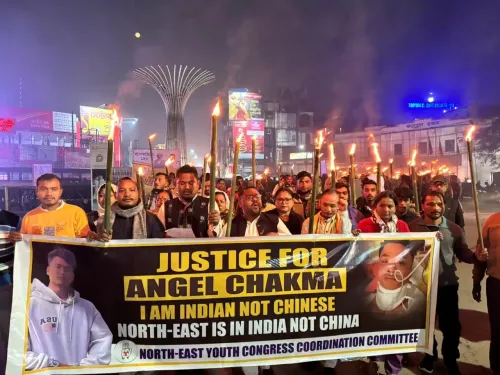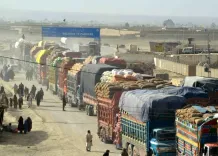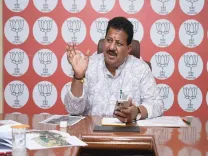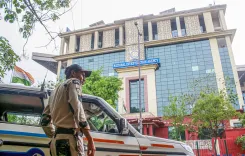'Does Karnataka Represent Progress Rooted in Wisdom?' PM Modi Celebrates 70th Kannada Rajyotsava
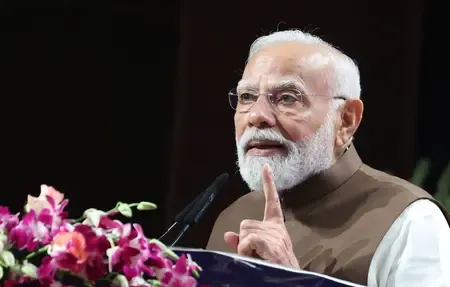
Synopsis
Key Takeaways
- Karnataka celebrates its rich cultural heritage on Kannada Rajyotsava.
- Prime Minister Modi emphasizes progress and wisdom.
- Historical figures are honored for their contributions.
- Annual festivities include cultural events and awards.
- Karnataka's legacy reflects a blend of tradition and modernity.
New Delhi, Nov 1 (NationPress) As Karnataka commemorates its 70th Kannada Rajyotsava, Prime Minister Narendra Modi took to social media on Saturday to convey heartfelt congratulations to the citizens of the state. He remarked that Karnataka exemplifies a spirit of progress deeply embedded in its rich culture and wisdom, praising the state's industrious and innovative nature that continues to inspire the entire nation.
In his message on platform X, PM Modi stated, “On this day of Kannada Rajyotsava, we honor the exceptional industriousness and excellence that define the people of Karnataka. We also celebrate the remarkable culture that Karnataka showcases through its literature, art, music, and more. The state truly embodies the spirit of progress grounded in wisdom. I wish for the happiness and health of everyone in the state.”
Similarly, Union Home Minister Amit Shah extended his greetings via X, saying: “Warm wishes to the brothers and sisters of Karnataka on their Rajyotsava! With a rich heritage of art, innovation, and knowledge, the people of Karnataka have made priceless contributions to our culture and to the growth of the nation. May the state thrive with prosperity and splendor.”
It was on November 1, 1956, that various Kannada-speaking regions of southern India were unified into a single state through linguistic reorganization. Although the term ‘Karnataka’ has ancient roots, the area now known as Karnataka was previously divided into over 20 administrative units, including princely states and parts of the Madras and Bombay presidencies, alongside the Nizam’s Hyderabad.
Recognizing the necessity for linguistic and administrative unity, the States Reorganisation Act of 1956 redefined boundaries, consolidating all Kannada-speaking areas into a singular Mysuru State.
On November 1, 1973, it was officially renamed Karnataka, symbolizing both unity and linguistic pride. Since that time, Kannada Rajyotsava has been celebrated annually with great enthusiasm and patriotic spirit.
The movement advocating for the unification of Karnataka began in the late 19th century, marked by the establishment of the Karnataka Vidyavardhaka Sangha in Dharwad in 1890 by R.H. Deshpande. Historical records indicate that the Sangha passed a resolution in 1912 urging the merging of Kannada-speaking regions under British rule.
The 70th Kannada Rajyotsava serves not only as a celebration of statehood but also as a tribute to the visionaries and unsung heroes who have shaped Karnataka’s identity throughout the years. From freedom fighters and reformers to scientists, artists, and social activists, their contributions exemplify the enduring spirit of a state that is deeply rooted in tradition yet propelled by progress.
Kannada Rajyotsava is recognized as a government holiday in Karnataka and is celebrated by Kannadigas around the globe. The day is marked by the announcement and presentation of the Rajyotsava Awards by the Karnataka government, the raising of the Karnataka flag, and addresses from the Chief Minister and the Governor, in addition to community festivals, orchestras, Kannada book releases, and concerts.
This year’s festivities honor those whose dedication and vision contributed to the Karnataka we cherish today. Among those celebrated is Sulebhavi Narayanamma, a groundbreaking social reformer and educator who advocated for women’s empowerment and rural education in North Karnataka long before these issues gained mainstream attention. Her relentless efforts laid the groundwork for gender equality and literacy in the region.
Another revered figure is H. S. Doreswamy, the late freedom fighter and Gandhian, whose activism extended far beyond the independence movement. A staunch advocate for civic integrity and environmental justice, Doreswamy became the moral compass of Karnataka’s democracy.
In the scientific realm, Dr. C. N. R. Rao, a Bharat Ratna awardee and one of the world’s leading chemists, has brought tremendous honor to Karnataka through his groundbreaking contributions to materials chemistry. His work has established Bengaluru as a global center for research and innovation.
Likewise, Dr. K. Kasturirangan, former chairman of ISRO, has played a crucial role in shaping India’s space program and advocating for educational reforms. His vision for the National Education Policy (NEP) 2020 highlights Karnataka’s intellectual leadership and commitment to knowledge-driven development.
The cultural richness of Karnataka is reflected in figures like Dr. Chandrashekhara Kambara, a Jnanpith Award-winning poet, playwright, and folklorist. His works capture the essence of rural life and the Kannada identity, while his tenure as Vice-Chancellor of Kannada University, Hampi, cultivated generations of artists and thinkers.
Equally inspiring is Dr. H. Sudarshan, a pioneer in public health and tribal rights activism whose efforts in remote forested areas revolutionized healthcare access for marginalized communities. His life exemplifies the compassion that characterizes Karnataka’s humanistic tradition.


